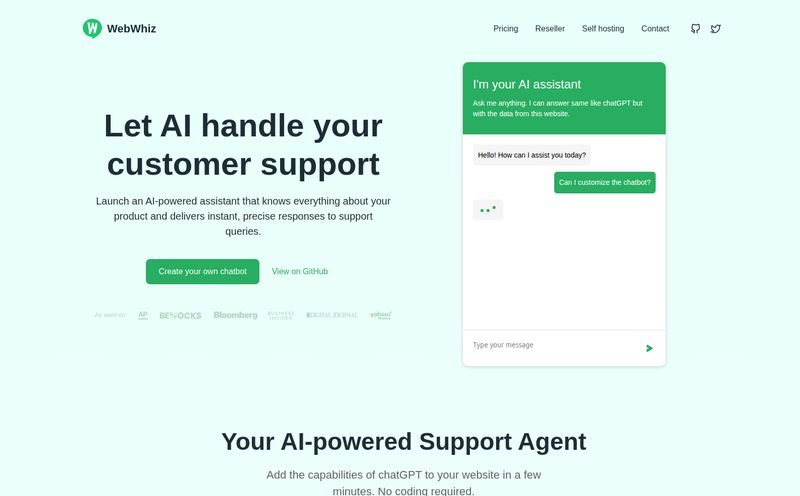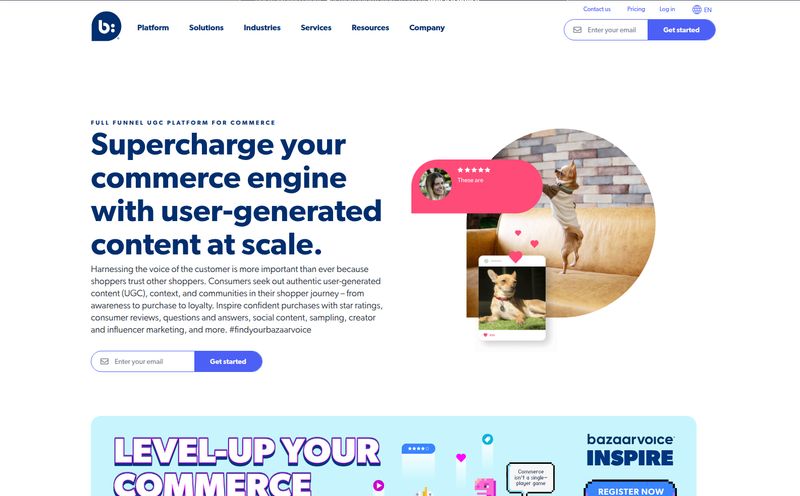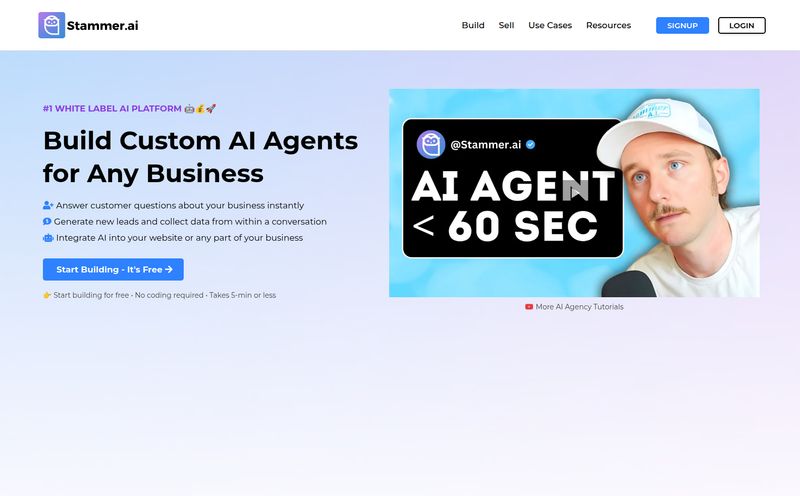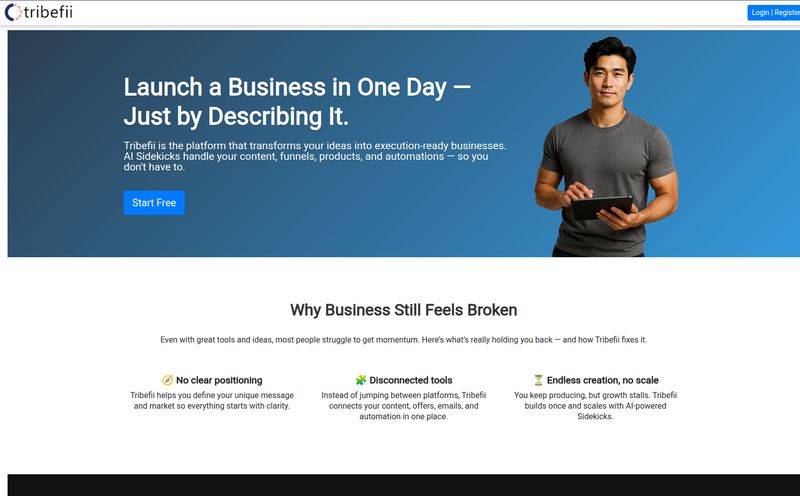Let’s have a little chat. You and me. As fellow marketing and product people, we know the grind. The content hamster wheel. You spend ages crafting the perfect product demo video. You record, you edit, you add slick callouts. It's beautiful. A work of art. Then, two weeks later, engineering pushes a UI update. Just a small one. They moved a button. And just like that, your masterpiece is obsolete. Your step-by-step guides are wrong. Your sales team is using outdated collateral. It’s a special kind of pain, isn't it?
For years, we've been juggling a half-dozen tools to do this dance. A screen recorder here, a video editor there, another tool for interactive guides, and a whole lot of manual work stitching it all together. It’s exhausting. So when I heard about a platform called Hexus that claims to use AI to make “magical product stories” and centralize this whole mess… my ears perked up. But I’ve been around this block a few times. ‘Magical’ is a big word. So, I decided to take a closer look.
So, What is Hexus, Really?
Okay, let's cut through the marketing copy. At its core, Hexus is a content creation platform built specifically for showcasing software products. Think of it as a Swiss Army knife for your product marketing. Instead of using separate tools for video recording, creating step-by-step tutorials, and building interactive demos, Hexus aims to do it all in one place.
The big hook is its AI engine. The idea is simple: you perform a workflow in your product once, and Hexus captures it. Then, its AI helps you instantly repurpose that single recording into a bunch of different content formats. An interactive demo where users click through themselves. A top-down video. A written guide with screenshots and annotations. It's a pretty compelling promise for anyone who's ever had to re-create the same tutorial in three different ways. It’s designed to pull you out of the production weeds so you can focus on the story you’re telling.
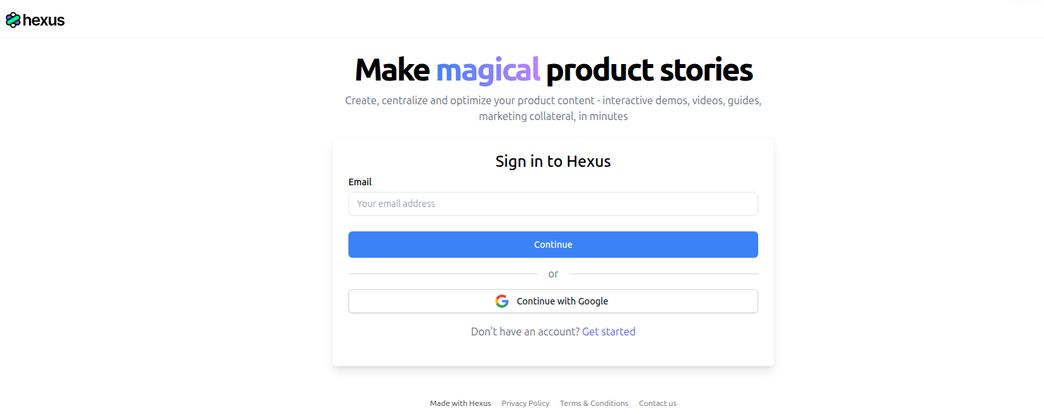
Visit Hexus
Who Should Be Using Hexus?
I’ve seen a lot of tools that claim to be for “everyone,” which usually means they’re not truly great for anyone. Hexus seems to have a clearer focus. This is for teams swimming in the product-led growth (PLG) waters. If your product is your main marketing and sales channel, you'll get what they’re doing here.
Specifically, I see this being a solid fit for:
- Product Marketers: This is the sweet spot. Creating and updating launch materials, feature announcements and website content is your world. Hexus is built to streamline that exact process.
- Sales & Pre-Sales Teams: Imagine creating personalized demos for prospects in minutes instead of hours. You can capture a specific workflow that addresses a prospect's pain point and send them a custom, interactive walkthrough. That’s a powerful move.
- Customer Success & Support: How many times have you had to explain the same process? With Hexus, you can build a library of easy-to-follow, always-up-to-date guides and tutorials. This could seriously cut down on support tickets and improve your onboarding flow.
If you're a solopreneur or a very small team, you might be able to get by with a collection of cheaper tools. But for growing SaaS companies where cross-team collaboration on product content is a constant challenge, Hexus starts to make a lot of sense.
The Hexus Features That Actually Matter
A long feature list can be deceiving. What really counts is whether those features solve real problems. Here’s my breakdown of what I found most interesting inside Hexus.
AI-Powered Creation: Your New Assistant?
The “AI” part is what everyone's talking about. After you record your screen, the platform automatically detects clicks, identifies elements, and breaks down the process into steps. It then generates text descriptions for each step. Is it perfect? No. You’ll definitely need to do some cleanup and editing. The AI might describe a button click a bit awkwardly, or you might want to rephrase for clarity. But it does about 70-80% of teh grunt work for you. It’s less of a magical solution and more of a really, really good assistant that sets everything up for you to finalize. And honestly, that’s a huge win.
From One-and-Done to One-and-Many: Content Repurposing
This, for me, is the real star of the show. The sheer efficiency of creating one “flow” and getting multiple assets from it is fantastic. That walkthrough you recorded for a new feature can become:
- An interactive demo on your website's feature page.
- A short video for your social media announcement.
- A step-by-step guide for your knowledge base.
- A GIF to drop into an email newsletter.
This isn’t just about saving time; it's about consistency. Every piece of content is perfectly aligned because it all came from the same source. No more slight variations between the video tutorial and the help doc.
Keeping It Fresh Without Losing Your Mind
Remember that dreaded UI update? Hexus has a clever approach to this. Since it understands the underlying elements of your page, you can often just re-record the flow on the new UI, and Hexus will help you update your existing guides and demos without starting from scratch. It’s not a one-click fix for every possible change, but it’s a world away from having to scrap everything and start over. This feature alone could justify the cost for teams managing a lot of product content.
Let's Talk Money: The Hexus Pricing Breakdown
Alright, the all-important question: what’s this going to cost? Pricing can be a major hurdle, so let’s lay it out. Hexus uses a pretty standard tiered model, which I appreciate. No hidden fees or overly complex calculations.
| Plan | Price (per month) | Who It's For |
|---|---|---|
| Basic | $0 | Individuals or anyone wanting to test the waters. It's a free plan with basic features. Good for getting a feel for the platform. |
| Starter | $49 | Small teams and power users. You get unlimited flows and more advanced AI editing and extension options. |
| Growth | $499 | Growing teams that need the whole package. This tier adds integrations (think CRM, etc.) and advanced personalization features. |
| Enterprise | Contact Sales | Large organizations needing enterprise-grade security, dedicated support, and custom workflows. |
Disclaimer: Pricing can change, so for the most current information, it’s always best to check their official pricing page directly.
The free plan is genuinely useful for trying it out. The jump to the Growth plan is substantial, but for a team of 5-10 people where this becomes a core part of your workflow, the price per seat isn't as scary as it looks at first glance.
The Not-So-Magical Parts (A Reality Check)
No tool is perfect, and I wouldn't be doing my job if I didn't point out some of the potential downsides. First, the price. While I think it's justifiable for the right team, that $499/month Growth plan will be a non-starter for many smaller businesses. This is a professional tool with a professional price tag.
Second, don’t expect the AI to read your mind. You still need to be the director. The AI is a tool, not a replacement for a good content strategist. You’ll need to review, edit, and inject your brand’s voice into the content it generates. Relying on it 100% without oversight could lead to generic or slightly inaccurate guides.
Finally, there can be a bit of a learning curve with the more advanced features. Getting the hang of the basic recording and editing is quick, but mastering things like advanced personalization and integrations will take some time and effort.
My Final Verdict: Is Hexus Worth the Hype?
So, do I think Hexus is “magical”? Maybe not in the wave-a-wand-and-it’s-done sense. But it is incredibly smart. It solves a real, nagging problem for product-led companies in a way that I haven't seen before. The pain of creating, managing, and updating product content is a massive, often invisible, time sink for marketing, sales and success teams.
Hexus tackles that problem head-on. It’s an investment, for sure. But if you calculate the hours your team currently spends on this stuff, the ROI could be surprisingly clear. For a fast-moving SaaS company, the ability to create high-quality, on-brand product content at scale is more than a convenience; it's a competitive advantage.
If you’re feeling that pain I described at the beginning, I’d say giving the Hexus free plan a spin is a no-brainer. It might just be the content creation partner you've been looking for.
Frequently Asked Questions about Hexus
- 1. Is the free version of Hexus good enough for a small startup?
- The free 'Basic' plan is fantastic for getting started and understanding the core functionality. You can create and share content, which is great for a solo founder or a very small team. However, you'll likely want to upgrade to the 'Starter' plan as soon as you need to create content more regularly or want more advanced editing features.
- 2. How much manual work is needed after the AI does its thing?
- It varies, but plan on spending some time on review and refinement. The AI does a great job with the structure and initial descriptions, but you'll want to tweak the language to match your brand's voice, perhaps add some extra context, or correct any minor misinterpretations. Think of it as a first draft generator, not a final publisher.
- 3. Can Hexus create demos for desktop applications, or just websites?
- Hexus is primarily designed for web-based applications and is delivered via a browser extension. It excels at capturing workflows within a browser, so it's ideal for SaaS products. For native desktop applications, you'd likely need a different screen recording solution.
- 4. Does Hexus integrate with other tools like a CRM or helpdesk?
- Yes, but integrations are primarily available on the 'Growth' and 'Enterprise' plans. These allow you to connect Hexus with your sales, marketing, and support stacks to create more seamless and personalized workflows.
- 5. How does Hexus compare to a tool like Loom?
- It's a great question. Loom is fantastic for quick, simple screen recordings and video messages. Hexus goes a step further by being a multi-format content creation platform. With Hexus, that one recording becomes an interactive demo and a written guide, not just a video. Hexus is more focused on creating durable, repurposable product assets, whereas Loom is often used for more ephemeral communication.
